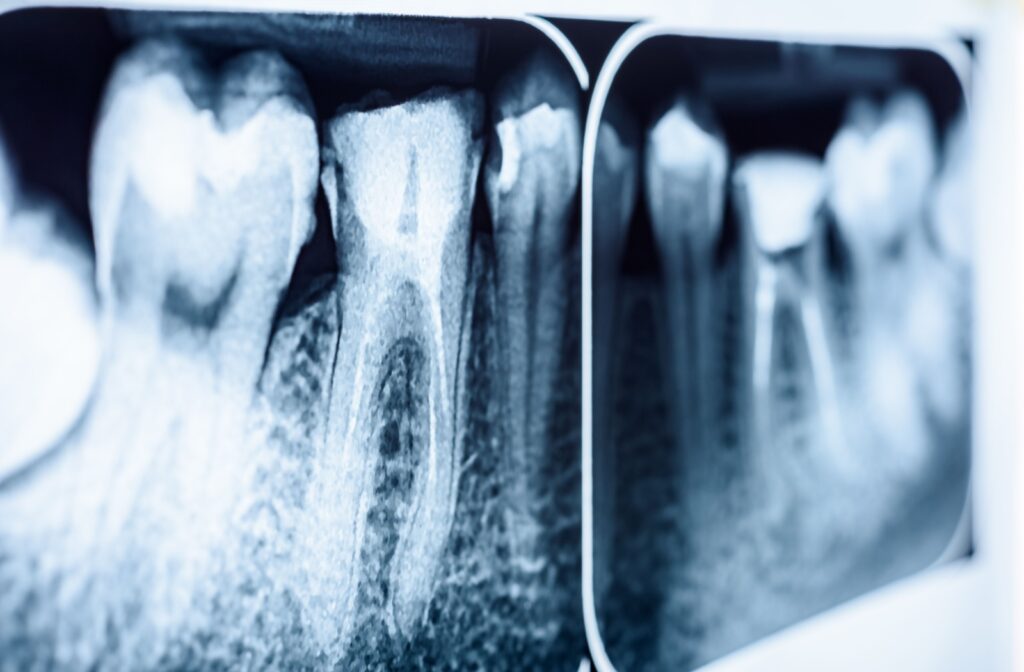A root canal is a common dental procedure that helps save a natural tooth from being removed. While root canals are an effective way to treat infected teeth, many people would prefer to avoid them altogether.
The most effective way to reduce the likelihood that you’ll need a root canal is a combination of consistent daily habits, protecting your teeth from injury, and attending regular dental check-ups. These proactive steps will help keep your and your family’s smiles healthy and strong for years to come.
Know the Signs You Might Need a Root Canal
Catching problems early is one of the most effective ways to prevent the need for a root canal. If you notice any changes in your teeth or gums, it’s a good idea to schedule a visit with your dentist in Okotoks. An early check-up can help address a small issue before it becomes a bigger one.
Common Symptoms to Watch For
Pay attention to what your mouth is telling you. Some common signs that a tooth may be in trouble include:
- A toothache that doesn’t go away
- Lingering sensitivity to hot or cold foods and drinks
- Swollen or tender gums near a specific tooth
- A discoloured tooth that looks darker than the others
- Pain when you bite down or touch a certain tooth
If you experience severe or sudden pain, it could be a dental emergency. You should visit your dentist immediately.
Simple Daily Habits for Healthy Teeth
Your daily routine plays a huge part in your family’s oral health. Consistent, simple habits make a big difference over time and are your first line of defence against tooth decay.
Brush & Floss Correctly
Great oral health starts with the basics. Make sure to brush at least two times a day with a fluoride toothpaste for two minutes each time. Daily flossing is also important because it removes plaque from between the teeth, where your toothbrush can’t reach.
Watch Your Food & Drinks
Foods and drinks high in sugar or acid can weaken tooth enamel over time. This includes obvious items like candy and soda, but also things like sports drinks and fruit juices. It’s helpful to limit these treats and to brush your teeth afterward when possible.
Stay Hydrated with Water
Water is great for your whole body, including your teeth, as it helps rinse away food particles and bacteria that can lead to cavities. Saliva is your mouth’s natural defence, and drinking enough water helps prevent a dry mouth.

Protect Your Teeth from Damage & Trauma
Sometimes, the need for a root canal comes from an injury, not decay. A crack or chip can expose the sensitive inner part of your tooth to bacteria. Protecting your teeth from this kind of damage is another important way to keep them healthy.
Wear a Mouthguard for Sports
If you or your children play sports, especially contact sports like hockey, lacrosse, or soccer, a mouthguard is a must, as it can cushion blows that would otherwise crack, chip, or knock out a tooth. A custom-fit mouthguard offers comfortable protection.
Address Teeth Grinding
Many people grind or clench their teeth, often while they sleep. This is a condition called bruxism. Over time, the resulting pressure can cause tiny cracks in the enamel, making teeth vulnerable to decay. If teeth grinding is an issue for you, a custom night guard from your dentist can protect your teeth.
Avoid Hard Foods & Objects
Chewing on hard things can fracture a tooth unexpectedly. Try to avoid chewing on ice, hard candy, popcorn kernels, or non-food items like pens or your fingernails. Being mindful of these habits can help prevent a dental emergency.
The Role of Regular Dental Visits
Even with great at-home care, professional cleanings and check-ups are key to maintaining your oral health. Your dental team can spot potential issues you can’t see or feel yourself. These visits empower you with information to care for your family’s smiles.
Why Check-ups Matter for Your Family
During a dental check-up, your dentist can find early signs of decay and check on the condition of old fillings. Professional cleanings also remove plaque and tartar that you can’t get off with a toothbrush. These visits are a cornerstone of preventative care for the whole family.
Early Steps Can Prevent Big Procedures
When a cavity is caught early, it can often be fixed with a simple filling. However, if cavities are left untreated, the resulting decay can travel deeper into the tooth and infect the sensitive inner tissue. This is what leads to the need for a root canal.
What to Know if a Root Canal Is Suggested
Hearing the words “root canal” can cause some concern, but understanding the procedure can help ease your worries. Modern dental care focuses on making you comfortable and preserving your natural teeth. It’s a restorative procedure designed to get you back to feeling good.
The Goal Is to Save Your Natural Tooth
A root canal isn’t about causing pain; it’s about relieving it. Root canals remove the infection from a tooth, which not only stops the toothache but can also save your tooth from needing extraction. Keeping your own natural teeth is almost always the preferred choice for long-term oral health.
Today’s Procedures Are Comfortable
With modern techniques and effective freezing (anesthetics), root canals are relatively painless. For those who feel anxious, options like sedation dentistry can provide extra comfort. Your dental team will walk you through every step.
Alternatives to a Root Canal
Saving your natural tooth is usually the first choice. The next best option is to have the tooth removed. While this is sometimes necessary, keeping your natural tooth in place helps maintain proper chewing function and prevents nearby teeth from shifting. Preventive care is a team effort between you and your dentist. By focusing on daily habits and regular check-ups, you can do a lot to keep your family’s smiles bright and healthy. If you have questions about your oral health, our team at Hometown Dental is here to help you find the answers.





